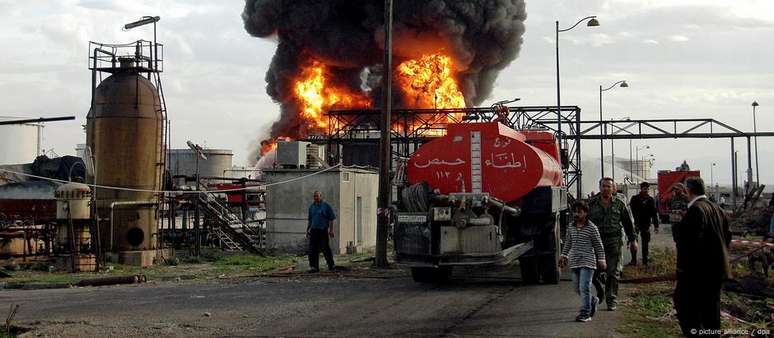Syria’s economy has shrunk by 85% in nearly 14 years of civil war, which has decimated infrastructure and devalued the currency. Reconstruction is expected to take a long time and depend on international support. In 2011, when the civil war began in Syria, the country’s gross domestic product (GDP) was $67.5 billion. Syria ranked 68th out of 196 countries in the global GDP ranking, with an economy comparable to that of Paraguay or Slovenia.
Last year, Syria’s GDP fell to 129th place in the same ranking, having shrunk by 85% to just $9 billion, according to World Bank estimates. The country is therefore at the same level as Chad and the Palestinian territories.
Almost 14 years of conflict, international sanctions and the exodus of 4.82 million people – more than a fifth of the population – have put a strain on the economy of what was already, before the civil war, one of the most poor people of the Eastern Middle East.
According to December data from the United Nations humanitarian aid agency, another 7 million Syrians, more than 30% of the population, are internally displaced.
The conflict has devastated infrastructure, causing permanent damage to electricity, transportation and health systems. Several cities, including Aleppo, Raqqa and Homs, were destroyed.
The Syrian currency suffered a sharp devaluation, which led to a huge drop in purchasing power. In 2023, the country experienced hyperinflation, according to the Syrian Center for Policy Research (SCPR), an independent research organization.
Last June, the SCPR said that more than half of Syrians were living in extreme poverty and were unable to meet their basic food needs.
The two main pillars of the Syrian economy – the oil sector and agriculture – have been decimated by the war. In 2010, oil exports accounted for about a quarter of government revenue, and food production contributed a similar percentage to GDP.
President Bashar al-Assad’s regime has lost control of most of its oil fields to rebel groups, including the Islamic State terrorist militia, but also to Kurdish-led forces in the country’s northeast.
Therefore, one of the priorities in the reconstruction of Syria is the government of the eastern province of Deir Zor, which holds about 40% of Syria’s oil reserves and several gas fields. The city of Deir Zor, capital of the province, is the largest in the east of the country and was occupied by Kurdish rebels during the fall of the Assad regime. The Kurds maintain an autonomous government in northeast Syria.
Debate on the end of sanctions
And then there are international economic sanctions, which have severely limited the government’s ability to export oil, grains and cotton. With oil production reduced to less than 20,000 barrels per day in regime-controlled areas, the country became heavily dependent on imports from Iran, which was a major ally of the regime.
The debate on ending sanctions against Syria has already begun. Expert Delaney Simon, of the independent organization International Crisis Group (ICG), focused on the prevention and resolution of armed conflicts, said that Syria is one of the most sanctioned countries in the world and that leaving such restrictions in place is equivalent to “removing the rug from under Syria as it tries to rise.”
Without an easing of restrictions, investors will continue to avoid the country and aid agencies may be wary of providing vital humanitarian aid to the population.
Government appointed by Islamists
Some analysts warn that it could take nearly ten years for Syria’s GDP to return to pre-civil war levels and two decades for the country to fully rebuild. And these prospects could worsen further in the event of greater political instability.
So, before starting the enormous task of rebuilding the cities, infrastructure, oil and agricultural sectors, clarity is needed on the new Syrian government.
This Tuesday (12/10), the rebels who overthrew Assad, led by the Islamist group Organization for the Liberation of the Levant (Hayat Tahrir al-Sham, or HTS), announced that the interim government will be led by Mohammed al-Bashir , who was appointed prime minister. Bashir said he will be tasked with leading the Syrian government until March 1. In January Bashir was appointed head of the “Salvation Government”, the HTS-linked administration of Idlib province and surrounding areas.
HTS itself is the subject of severe international sanctions, as it is classified as a terrorist organization by the United States and the United Nations. Western and Arab nations fear the group will attempt to impose an Islamic fundamentalist government in Syria.
The Associated Press news agency reported that the Biden administration is considering removing HTS from the list of terrorist groups, citing two senior White House officials. One of them justified the decision by saying that HTS is an important component in Syria’s short-term future.
American President Joe Biden said that the United States will dialogue with all Syrian groups, including as part of the United Nations-led process, so that there is a transition towards an “independent and sovereign” country, with a new Constitution.
Biden warned that Syria faces a period of risk and uncertainty and that the United States will help where possible.
The European Union announced that it is not in contact with HTS or its leaders and that it will evaluate not only the group’s words but also its actions.
The U.N. envoy for Syria, Geir Pedersen, said the rebel groups “sent good messages” about national unity and inclusion, but acknowledged that the main of these groups are considered terrorists by the United Nations. “Frankly we have also seen reassuring things in Aleppo and Hama.”
Slow return to everyday life
A nationwide curfew imposed by rebels led to the closure of most businesses across Syria on Monday, but banks and businesses began reopening on Tuesday. Syrian currency continues to be used.
The Ministry of Petroleum has asked all industry employees to report to their workplaces from Tuesday, adding that protection will be provided to ensure their safety.
U.N. humanitarian aid chief Tom Fletcher said his agency would do everything it could to support people in need, including hosting shelters and distributing food, water, fuel, tents and blankets.
While several European countries, including Germany, said they would suspend the processing of asylum applications from Syrian citizens, the United Nations refugee agency, UNHCR, called for “patience and vigilance” on the issue of the return of the refugees.
Austria went further than most European countries, saying it was preparing an “orderly repatriation and deportation programme” for the Syrians.
Source: Terra
Rose James is a Gossipify movie and series reviewer known for her in-depth analysis and unique perspective on the latest releases. With a background in film studies, she provides engaging and informative reviews, and keeps readers up to date with industry trends and emerging talents.






